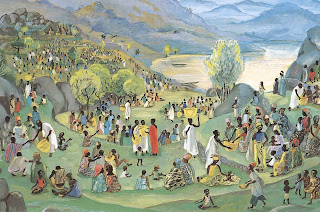The Gospel of Matthew has parables of Jesus that talk about talents. Despite scores of sermons that tell us otherwise, these talents do not refer to gifts, skills, or competencies. During Jesus's time, a talent (talanton) referred to the largest unit of currency and was roughly equivalent to about 20 years of labor. The New International Version translates it correctly: talents were bags of gold!
So, the 10,000 bags of gold in Sunday's lection was equivalent to 200,000 years of labor. Or about 12 billion US dollars!
For me the key to making sense of the parable (outside of how Matthew uses the tradition) is the ten thousand talents! When Rome conquered Palestine in 63 BCE, the taxes the empire exacted from its colony was that exact amount. (See Josephus, Antiquities, 14.78) By the time of Jesus, Palestine had been under Roman Occupation for almost a hundred years. Half of the population were slowly starving to death. Exploitation was rampant and tax collectors were among the most hated in the land. And Rome executed up to 500 "enemies of the state" daily to remind everyone that defiance was unacceptable behavior.
So the king in the parable pardons a huge debt which was not really owed. Then and now the powerful have laws, ledgers, books, documents, and, yes, theologies that show and teach how much the powerless are indebted to them. And payment always requires more than what is owed.
And the servant whose supposed debt was canceled? He does exactly what the exploitative system has shaped him to do, be the face of the colonizer to the colonized. More often than not, the colonized never see the face of the colonizer--thet see only his agents who come from among the colonized. Then and now the colonizer remains benevolent.
Read the parable again. The king comes out smelling like a newly-bathed baby. The colonized are portrayed as seeking the king's favor. And one of them is actually tortured on orders of the king.
Do not forget this. Ever. The king in the parable is a king and served as a metaphor for the Roman Emperor. For Trump? I'd say, yes. For Duterte? Yes. For Marcos and his Junior? Yes again. For God? Never.









